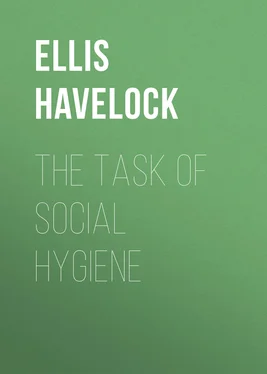Havelock Ellis - The Task of Social Hygiene
Здесь есть возможность читать онлайн «Havelock Ellis - The Task of Social Hygiene» — ознакомительный отрывок электронной книги совершенно бесплатно, а после прочтения отрывка купить полную версию. В некоторых случаях можно слушать аудио, скачать через торрент в формате fb2 и присутствует краткое содержание. Жанр: psy_sex_and_family, foreign_psychology, foreign_edu, на английском языке. Описание произведения, (предисловие) а так же отзывы посетителей доступны на портале библиотеки ЛибКат.
- Название:The Task of Social Hygiene
- Автор:
- Жанр:
- Год:неизвестен
- ISBN:нет данных
- Рейтинг книги:5 / 5. Голосов: 1
-
Избранное:Добавить в избранное
- Отзывы:
-
Ваша оценка:
- 100
- 1
- 2
- 3
- 4
- 5
The Task of Social Hygiene: краткое содержание, описание и аннотация
Предлагаем к чтению аннотацию, описание, краткое содержание или предисловие (зависит от того, что написал сам автор книги «The Task of Social Hygiene»). Если вы не нашли необходимую информацию о книге — напишите в комментариях, мы постараемся отыскать её.
The Task of Social Hygiene — читать онлайн ознакомительный отрывок
Ниже представлен текст книги, разбитый по страницам. Система сохранения места последней прочитанной страницы, позволяет с удобством читать онлайн бесплатно книгу «The Task of Social Hygiene», без необходимости каждый раз заново искать на чём Вы остановились. Поставьте закладку, и сможете в любой момент перейти на страницу, на которой закончили чтение.
Интервал:
Закладка:
Galton was quite well aware that the improved breeding of men is a very different matter from the improved breeding of animals, requiring a different knowledge and a different method, so that the ridicule which has sometimes been ignorantly flung at Eugenics failed to touch him. It would be clearly undesirable to breed men, as animals are bred, for single points at the sacrifice of other points, even if we were in a position to breed men from outside. Human breeding must proceed from impulses that arise, voluntarily, in human brains and wills, and are carried out with a human sense of personal responsibility. Galton believed that the first need was the need of knowledge in these matters. He was not anxious to invoke legislation. 24 24 Only a year before his death Galton wrote (Preface to Essays in Eugenics ): "The power by which Eugenic reform must chiefly be effected is that of Popular Opinion, which is amply strong enough for that purpose whenever it shall be roused."
The compulsory presentation of certificates of health and good breeding as a preliminary to marriage forms no part of Eugenics, nor is compulsory sterilization a demand made by any reasonable eugenist. Certainly the custom of securing certificates of health and ability is excellent, not only as a preliminary to marriage, but as a general custom. Certainly, also, there are cases in which sterilization is desirable, if voluntarily accepted. 25 25 It may perhaps be necessary to remark that by sterilization is here meant, not castration, but, in the male vasectomy (and a corresponding operation in the female), a simple and harmless operation which involves no real mutilation and no loss of power beyond that of procreation. See on this and related points, Havelock Ellis, Studies in the Psychology of Sex , Vol. VI, "Sex in Relation to Society," chap. xii.
But neither certification nor sterilization should be compulsory. They only have their value if they are intelligent and deliberate, springing out of a widened and enlightened sense of personal responsibility to society and to the race.
Eugenics constitutes the link between the Social Reform of the past, painfully struggling to improve the conditions of life, and the Social Hygiene of the future, which is authorized to deal adequately with the conditions of life because it has its hands on the sources of life. On this plane we are able to concentrate our energies on the finer ends of life, because we may reasonably expect to be no longer hampered by the ever-increasing burdens which were placed upon us by the failure to control life; while the more we succeed in our efforts to purify and strengthen life, the more magnificent become the tasks we may reasonably hope to attempt and compass.
A problem which is often and justly cited as one to be settled by Eugenics is that presented by the existence among us of the large class of the feeble-minded. No doubt there are some who would regret the disappearance of the feeble-minded from our midst. The philosophies of the Bergsonian type, which to-day prevail so widely, place intuition above reason, and the "pure fool" has sometimes been enshrined and idolized. But we may remember that Eugenics can never prevent absolutely the occurrence of feeble-minded persons, even in the extreme degree of the imbecile and the idiot. 26 26 The term "feeble-minded" may be used generally to cover all degrees of mental weakness. In speaking a little more precisely, however, we have to recognize three main degrees of congenital mental weakness: feeble-mindedness , in which with care and supervision it is possible to work and earn a livelihood; imbecility , in which the subject is barely able to look after himself, and sometimes only has enough intelligence to be mischievous (the moral imbecile); and idiocy , the lowest depth of all, in which the subject has no intelligence and no ability to look after himself. More elaborate classifications are sometimes proposed. The method of Binet and Simon renders possible a fairly exact measurement of feeble-mindedness.
They come within the range of variation, by the same right as genius so comes. We cannot, it may be, prevent the occurrence of such persons, but we can prevent them from being the founders of families tending to resemble themselves. And in so doing, it will be agreed by most people, we shall be effecting a task of immense benefit to society and the race.
Feeble-mindedness is largely handed on by heredity. It was formerly supposed that idiocy and feeble-mindedness are mainly due to environmental conditions, to the drink, depravity, general disease, or lack of nutrition of the parents, and there is no doubt an element of truth in that view. But serious and frequent as are the results of bad environment and acquired disease in the parentage of the feeble-minded, they do not form the fundamental factor in the production of the feeble-minded. 27 27 Mott ( Archives of Neurology and Psychiatry , Vol. V, 1911) accepts the view that in some cases feeble-mindedness is simply a form of congenital syphilis, but he points out that feeble-mindedness abounds in many rural districts where syphilis, as well as alcoholism, is very rare, and concludes by emphasizing the influence of heredity; the prevalence of feeble-mindedness in these rural districts is thus due to the fact that the mentally and physically fit have emigrated to the great industrial centres, leaving the unfit to procreate the race.
Feeble-mindedness is essentially a germinal variation, belonging to the same large class as all other biological variations, occurring, for the most part, in the first place spontaneously, but strongly tending to be inherited. It thus resembles congenital cataract, deaf-mutism, the susceptibility to tuberculous infection, etc. 28 28 "Whether germinal variations," remarked Dr. R.J. Ryle at a Conference on Feeble-mindedness ( British Medical Journal , October 3, 1911), "be expressed by cleft palate, cataract, or cerebral deficiency of the pyramidal cells in the brain cortex, they may be produced, and, when once produced, they are reproduced as readily as the perfected structure of the face or eye or brain, if the gametes which contain these potentialities unite to form the ovum. But Nature is not only the producer. Given a fair field and no favour, natural selection would leave no problem of the unfit to perplex the mind of man who looks before and after. This we know cannot be, and we know, too, that we have no longer the excuse of ignorance to cover the neglect of the new duties which belong to the present epoch of civilization. We know now that we have to deal with a growing group in our community who demand permanent care and control as well for their own sakes as for the welfare of the community. All are now agreed on the general principle of segregation, but it is true that something more than this should be forthcoming. The difficulties of theory are clearing up as our wider view obtains a firmer grasp of our material, but the difficulties of practice are still before us." These remarks correspond with the general results reached by the Royal Commission on the Feeble-minded, which issued its voluminous facts and conclusions in 1908.
Exact investigation is now showing that feeble-mindedness is passed on from parent to child to an enormous extent. Some years ago Ashby, speaking from a large experience in the North of England, estimated that at least seventy-five per cent of feeble-minded children are born with an inherited tendency to mental defect. More precise investigation has since shown that this estimate was under the mark. Tredgold, who in England has most carefully studied the heredity of the feeble-minded, 29 29 See, for instance, A.F. Tredgold, Mental Deficiency , 1908.
found that in over eighty-two per cent cases there is a bad nervous inheritance. In a large number of cases the bad heredity was associated with alcoholism or consumption in the parentage, but only in a small proportion of cases (about seven per cent) was it probable that alcoholism and consumption alone, and usually combined, had sufficed to produce the defective condition of the children, while environmental conditions only produced mental defect in ten per cent cases. 30 30 The investigation of Bezzola showing that the maxima in the conception of idiots occur at carnival time, and especially at the vintage, has been held (especially by Forel) to indicate that alcoholism of the parents at conception causes idiocy in the offspring. It may be so. But it may also be that the licence of these periods enables the defective members of the community to secure an amount of sexual activity which they would be debarred from under normal conditions. In that case the alcoholism would merely liberate, and not create, the idiocy-producing mechanism.
Heredity is the chief cause of feeble-mindedness, and a normal child is never born of two feeble-minded parents. The very thorough investigation of the heredity of the feeble-minded which is now being carried on at the institution for their care at Vineland, New Jersey, shows even more decisive results. By making careful pedigrees of the families to which the inmates at Vineland belong it is seen that in a large proportion of cases feeble-mindedness is handed on from generation to generation, and is traceable through three generations, though it sometimes skips a generation. In one family of three hundred and nineteen persons, one hundred and nineteen were known to be feeble-minded, and only forty-two known to be normal. The families tended to be large, sometimes very large, most of them in many cases dying in infancy or growing up weak-minded. 31 31 Godden, Eugenics Review , April, 1911.
Интервал:
Закладка:
Похожие книги на «The Task of Social Hygiene»
Представляем Вашему вниманию похожие книги на «The Task of Social Hygiene» списком для выбора. Мы отобрали схожую по названию и смыслу литературу в надежде предоставить читателям больше вариантов отыскать новые, интересные, ещё непрочитанные произведения.
Обсуждение, отзывы о книге «The Task of Social Hygiene» и просто собственные мнения читателей. Оставьте ваши комментарии, напишите, что Вы думаете о произведении, его смысле или главных героях. Укажите что конкретно понравилось, а что нет, и почему Вы так считаете.












